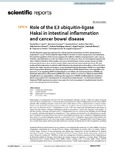Role of the E3 Ubiquitin-Ligase Hakai in Intestinal Inflammation and Cancer Bowel Disease

Use this link to cite
http://hdl.handle.net/2183/32297Collections
- Investigación (FCIE) [1227]
Metadata
Show full item recordTitle
Role of the E3 Ubiquitin-Ligase Hakai in Intestinal Inflammation and Cancer Bowel DiseaseAuthor(s)
Date
2022-10-20Citation
Roca-Lema, D., Quiroga, M., Khare, V. et al. Role of the E3 ubiquitin-ligase Hakai in intestinal inflammation and cancer bowel disease. Sci Rep 12, 17571 (2022). https://doi.org/10.1038/s41598-022-22295-w
Abstract
[Abstract] The E3 ubiquitin-ligases are important for cellular protein homeostasis and their deregulation is implicated in cancer. The E3 ubiquitin-ligase Hakai is involved in tumour progression and metastasis, through the regulation of the tumour suppressor E-cadherin. Hakai is overexpressed in colon cancer, however, the implication in colitis-associated cancer is unknown. Here, we investigated the potential role of Hakai in intestinal inflammation and cancer bowel disease. Several mouse models of colitis and associated cancer were used to analyse Hakai expression by immunohistochemistry. We also analysed Hakai expression in patients with inflamed colon biopsies from ulcerative colitis and Crohn's disease. By Hakai interactome analysis, it was identified Fatty Acid Synthase (FASN) as a novel Hakai-interacting protein. Moreover, we show that Hakai induces FASN ubiquitination and degradation via lysosome, thus regulating FASN-mediated lipid accumulation. An inverse expression of FASN and Hakai was detected in inflammatory AOM/DSS mouse model. In conclusion, Hakai regulates FASN ubiquitination and degradation, resulting in the regulation of FASN-mediated lipid accumulation, which is associated to the development of inflammatory bowel disease. The interaction between Hakai and FASN may be an important mechanism for the homeostasis of intestinal barrier function and in the pathogenesis of this disease.
Keywords
Cancer
Cell biology
Diseases
Molecular biology
Cell biology
Diseases
Molecular biology
Editor version
Rights
Atribución 4.0 Internacional
ISSN
2045-2322






